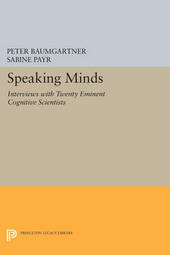
|
Speaking Minds: Interviews with Twenty Eminent Cognitive Scientists
Paperback / softback
Main Details
| Title |
Speaking Minds: Interviews with Twenty Eminent Cognitive Scientists
|
| Authors and Contributors |
Edited by Peter Baumgartner
|
|
Edited by Sabine Payr
|
| Series | Princeton Legacy Library |
|---|
| Physical Properties |
| Format:Paperback / softback | | Pages:350 | | Dimensions(mm): Height 229,Width 152 |
|
| Category/Genre | Artificial intelligence |
|---|
| ISBN/Barcode |
9780691603209
|
| Classifications | Dewey:153 |
|---|
| Audience | | Tertiary Education (US: College) | | Professional & Vocational | |
|---|
| Illustrations |
20 halftones
|
|
Publishing Details |
| Publisher |
Princeton University Press
|
| Imprint |
Princeton University Press
|
| Publication Date |
14 July 2014 |
| Publication Country |
United States
|
Description
Few developments in the intellectual life of the past quarter-century have provoked more controversy than the attempt to engineer human-like intelligence by artificial means. Born of computer science, this effort has sparked a continuing debate among the psychologists, neuroscientists, philosophers,and linguists who have pioneered--and criticized--
Reviews"An invaluable accompaniment to a standard text and an excellent educated layman's introduction to some of the more computational issues in the science of the mind."--Richard Cooper, The Times Higher Education Supplement "Enough food for thought to satisfy the most hungry of intellects."--New Scientist "These edited interviews of prominent workers in the cognitive science arena reveal lively disagreement on basic concepts, particularly between the two dominant camps... A multiperspective overview of the evolution and objective of this relatively new discipline."--Booklist "The editors, Peter Baumgartner and Sabine Payr, have done a brilliant job. Enough food for thought to satisfy the most hungry of intellects."--New Scientist "The frank and friendly style of the interviews makes the book both an invaluable accompaniment to a standard text and an excellent educated layman's introduction to some of the more computational issues in the science of the mind."--Richard Cooper, The Times Higher Education Supplement "The authors' goal was not simply to produce another text that serves to introduce cognitive science but rather to give readers a feeling of the excitement of the field by helping them understand the personal commitment of these researchers and their connections to the work and thoughts of others in the field. They were clearly successful."--Choice
|